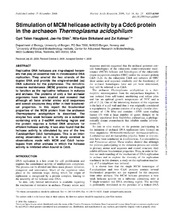Stimulation of MCM helicase activity by a Cdc6 protein in the archaeon Thermoplasma acidophilum
Peer reviewed, Journal article
Published version

Åpne
Permanent lenke
http://hdl.handle.net/1956/12094Utgivelsesdato
2006-11-15Metadata
Vis full innførselSamlinger
Sammendrag
Replicative DNA helicases are ring-shaped hexamers that play an essential role in chromosomal DNA replication. They unwind the two strands of the duplex DNA and provide the single-stranded (ss) DNA substrate for the polymerase. The minichromosome maintenance (MCM) proteins are thought to function as the replicative helicases in eukarya and archaea. The proteins of only a few archaeal organisms have been studied and revealed that although all have similar amino acid sequences and overall structures they differ in their biochemical properties. In this report the biochemical properties of the MCM protein from the archaeon Thermoplasma acidophilum is described. The enzyme has weak helicase activity on a substrate containing only a 3′-ssDNA overhang region and the protein requires a forked DNA structure for efficient helicase activity. It was also found that the helicase activity is stimulated by one of the two T.acidophilum Cdc6 homologues. This is an interesting observation as it is in sharp contrast to observations made with MCM and Cdc6 homologues from other archaea in which the helicase activity is inhibited when bound to Cdc6.
